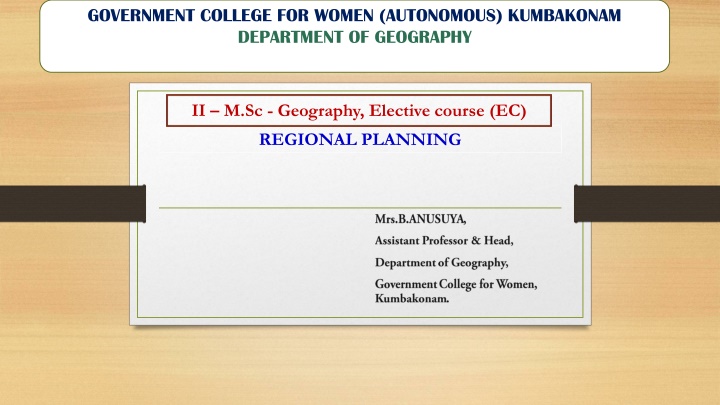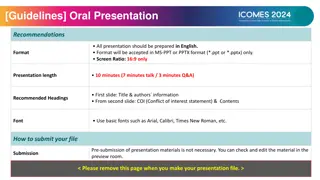
Economic Planning: Importance and Implementation
Delve into the realm of economic planning, exploring its definition, significance, and processes. Learn about the conscious efforts by governments to allocate resources efficiently for long-term objectives, shaping national development. Discover the critical role of planning in guiding economic activities and optimizing outcomes for the welfare of the nation.
Uploaded on | 2 Views
Download Presentation

Please find below an Image/Link to download the presentation.
The content on the website is provided AS IS for your information and personal use only. It may not be sold, licensed, or shared on other websites without obtaining consent from the author. If you encounter any issues during the download, it is possible that the publisher has removed the file from their server.
You are allowed to download the files provided on this website for personal or commercial use, subject to the condition that they are used lawfully. All files are the property of their respective owners.
The content on the website is provided AS IS for your information and personal use only. It may not be sold, licensed, or shared on other websites without obtaining consent from the author.
E N D
Presentation Transcript
GOVERNMENT COLLEGE FOR WOMEN (AUTONOMOUS) KUMBAKONAM DEPARTMENT OF GEOGRAPHY II M.Sc - Geography, Elective course (EC) REGIONAL PLANNING
UNIT: III PLANNING IN INDIA Definition of Planning: Planning is the process of thinking about the activities required to achieve a desired goal. It is the first and foremost activity to achieve desired results. ... Also, planning has a specific process and is necessary for multiple occupations (particularly in fields such as management, business, etc.)
Introduction: There is a wide diversity of opinion with regard to the meaning, nature and scope of Economic Planning. The word Planning has been used in a variety of ways and in different senses and therefore economistst or people have experienced difficulty of
The term has been indiscriminately used in ecomomic literature and type of Governmental activity having a definite goal has been taken to mean as Planning Economic planning involves not only economic and political decisions. But, has a bearing on certain ideological issues as well. Definition: According to Professor ROBBINS Strictly speaking, all economic life inolves planning. To plan is to act with a purpose to choice is the essence of economic activity. Further he has explained as follows.
Economic Planning is a concious and carefully thoughout process, initiated by the Government, for estimating the potential wealth of the country and for utiliting the availability resources as efficiently as possible with a view to fullfill some definite long term objectives. DICKINSON has defined planning as the making of major economic decisions - what to produce, where to produce and whom to produce, on the economic system as a whole.
Importance of Planning: The main objective of economic planning is to use the national resources in the best interest of the nation as a whole. A art from the planning can be guidance of economic activities by a communal organ through a scheme which describes in quantitative as well as qualitative terms, the productive process that caught to be undertaken during designated future period. The need of planning started from varied sources. At some places or in some countries it was felt for utilizing the available resources to attain optimum result.
In other for social equality and in some others the idea of strengthening the political power of the nation was predominate. All that necessitated planning. Scientists, socialists, economists, nationalists, socialists, militarists, politicians and all other for one reason or the other. Today favored planned way of production and distribution.
History of Planning in India: Planning could be adopted in India only after Independence. But, it's age has taken roots several years before. It can be traced back to the beginning of the thirties of the 20th century. I - Stage: In 1934, sir M.Visvesvarraya Published the Book, planned economy for India, in which he formulated a 10 -year plan for economic development of the country, which considerately influenced the thinking of the Government and the people alike.
II -Stage: The new constitution was inaugurated on April - 1, 1937 and the Indian National Congress formulated a definite policy with regard to industrial and social Planning. It was ended to the congress ministries appointment of a committee of experts to consider the urgent and vital- problems, the solution of which was necessary to any scheme of national reconstruction and social planning. III - Stage: In July - 1938, it was decided to convene a conference of the ministers of industries of various provinces. The conference was held in Delhi and the laid down was that the problems of poverty and unemployment.
The National defense and of economic regeneration could not be solved without rapid industrialization. It was decided, to draw up a comprehensive scheme of National Planning Committee was appointed under the chairmanship of pundit Jawaharlal Nehru. Professor K.T.SHAH was its general secretary. It was thus the first attempt of its kind on the part of the country and to draw up a co-oriented plan for national economic regeneration.
A Number of committee were appointed policies were laid down, vital conflicting views were examined regarding Agricultural development, Industrialization, development of basic, cottage and small scale industries and others. Later in 1941 a committee was set up to prepare a plan for the whole country under the chairmanship of sir Ramaswami Mudaliar. By the end of 1943 some of the eminent industrialists prepared.
A Plan of Economic Development for India popularly known as the BOMBAY PLAN. It's main purpose was to stimulate the thinking of the people and to lay down the principles in the light of which a National plan could be formulated and executed. A systematic scheme of economic planning was part 4th by Bombay Planners. During the plan period the committee made the whole country plan-minded and based on 1931-32 statistics.
After the Implementation of the Bombay Plan the Government issued a report on the progress of Reconstructing as in India prepared by the Planning Committee. In this Report the Government explained the measures that they were planning to adopt for India's economic development. The report many recommendations. Almost simultaneously with the Bombay Plan People's Plan ( A Ten Year Plan) of Mr.M.N. Roy was announced. In this plan the priority given to the Agricultural and Consumer goods industries. In contrast with the above 2 Plans, there appeared the Gandhian Plan. It was based upon Gandhian Philosophy, such as simplicity, Non-Violence, Sanctity of labour and Human values. But it was several criticized by the economists, politicians and others. It laid emphasis on the self-sufficiency of every village as a unit.
The Government was formed on 24th August 1946. The food situation in the country was alarming and the Government, book emergent steps in respect of (i) Imports from a road, (ii) Internal procurement and distribution through price fixation and rationing. (iii) Grow -more -food campaign. The National Government came to power on August 15, 1947. When India become independent in 1947, it was gripped by mass poverty, unemployment and under employment, illiterate and unskilled labour, static Agriculture, less developed industries and poor infra-structure. The Government gave a promise for the appointment of a planning commission, which was ultimately set up in March 1950.






















